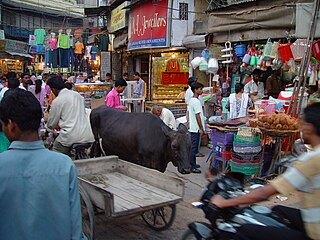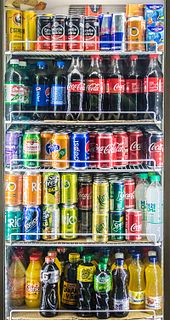The Austrian School is a heterodox school of economic thought that advocates strict adherence to methodological individualism, the concept that social phenomena result primarily from the motivations and actions of individuals and their self interest. Austrian school theorists hold that economic theory should be exclusively derived from basic principles of human action.

Friedrich August von Hayek, often referred to by his initials F. A. Hayek, was an Austrian-British polymath, whose areas of interest included economics, political philosophy, psychology, and intellectual history. Hayek shared the 1974 Nobel Memorial Prize in Economic Sciences with Gunnar Myrdal for work on money and economic fluctuations, and the interdependence of economic, social and institutional phenomena. His account of how prices communicate information is widely regarded as an important contribution to economics that led to him receiving the prize.

Microeconomics is a branch of economics that studies the behavior of individuals and firms in making decisions regarding the allocation of scarce resources and the interactions among these individuals and firms. Microeconomics focuses on the study of individual markets, sectors, or industries as opposed to the national economy as a whole, which is studied in macroeconomics.

Milton Friedman was an American economist and statistician who received the 1976 Nobel Memorial Prize in Economic Sciences for his research on consumption analysis, monetary history and theory and the complexity of stabilization policy. With George Stigler, Friedman was among the intellectual leaders of the Chicago school of economics, a neoclassical school of economic thought associated with the work of the faculty at the University of Chicago that rejected Keynesianism in favor of monetarism until the mid-1970s, when it turned to new classical macroeconomics heavily based on the concept of rational expectations. Several students, young professors and academics who were recruited or mentored by Friedman at Chicago went on to become leading economists, including Gary Becker, Robert Fogel, and Robert Lucas Jr.
In economics, utility is a measure of the satisfaction that a certain person has from a certain state of the world. Over time, the term has been used in at least two different meanings.
The theory of consumer choice is the branch of microeconomics that relates preferences to consumption expenditures and to consumer demand curves. It analyzes how consumers maximize the desirability of their consumption, by maximizing utility subject to a consumer budget constraint. Factors influencing consumers' evaluation of the utility of goods include: income level, cultural factors, product information and physio-psychological factors.
Economic freedom, or economic liberty, refers to the agency of people to make economic decisions. This is a term used in economic and policy debates as well as in the philosophy of economics. One approach to economic freedom comes from the liberal tradition emphasizing free markets, free trade, and private property. Another approach to economic freedom extends the welfare economics study of individual choice, with greater economic freedom coming from a larger set of possible choices. Other conceptions of economic freedom include freedom from want and the freedom to engage in collective bargaining.
Managerial economics is a branch of economics involving the application of economic methods in the organizational decision-making process. Economics is the study of the production, distribution, and consumption of goods and services. Managerial economics involves the use of economic theories and principles to make decisions regarding the allocation of scarce resources. It guides managers in making decisions relating to the company's customers, competitors, suppliers, and internal operations.
In gambling, economics, and the philosophy of probability, a Dutch book or lock is a set of odds and bets that ensures a guaranteed profit. It is generally used as a thought experiment to motivate Von Neumann–Morgenstern axioms or the axioms of probability by showing they are equivalent to philosophical coherence or Pareto efficiency.
Revealed preference theory, pioneered by economist Paul Anthony Samuelson in 1938, is a method of analyzing choices made by individuals, mostly used for comparing the influence of policies on consumer behavior. Revealed preference models assume that the preferences of consumers can be revealed by their purchasing habits.

The capability approach is a normative approach to human welfare that concentrates on the actual capability of persons to achieve lives they value rather than solely having a right or freedom to do so. It was conceived in the 1980s as an alternative approach to welfare economics.
In microeconomics, search theory studies buyers or sellers who cannot instantly find a trading partner, and must therefore search for a partner prior to transacting. It involves determining the best approach to use when looking for a specific item or person in a sizable, uncharted environment. The goal of the theory is to determine the best search strategy, one that maximises the chance of finding the target while minimising search-related expenses.

The Paradox of Choice – Why More Is Less is a book written by American psychologist Barry Schwartz and first published in 2004 by Harper Perennial. In the book, Schwartz argues that eliminating consumer choices can greatly reduce anxiety for shoppers. The book analyses the behavior of different types of people. This book argues that the dramatic explosion in choice—from the mundane to the profound challenges of balancing career, family, and individual needs—has paradoxically become a problem instead of a solution and how our obsession with choice encourages us to seek that which makes us feel worse.

Kotaro Suzumura was a Japanese economist and professor emeritus of Hitotsubashi University and Waseda University. He graduated from Hitotsubashi University in 1966. His research interests were in social choice theory and welfare economics. He was also a Fellow of the Econometric Society. He was named a Person of Cultural Merit in 2017.
In social choice theory, a dictatorship mechanism is a rule by which, among all possible alternatives, the results of voting mirror a single pre-determined person's preferences, without consideration of the other voters. Dictatorship by itself is not considered a good mechanism in practice, but it is theoretically important: by Arrow's impossibility theorem, when there are at least three alternatives, dictatorship is the only ranked voting electoral system that satisfies unrestricted domain, Pareto efficiency, and independence of irrelevant alternatives. Similarly, by Gibbard's theorem, when there are at least three alternatives, dictatorship is the only strategyproof rule.
Choice architecture is the design of different ways in which choices can be presented to decision makers, and the impact of that presentation on decision-making. For example, each of the following:
In economics, and in other social sciences, preference refers to an order by which an agent, while in search of an "optimal choice", ranks alternatives based on their respective utility. Preferences are evaluations that concern matters of value, in relation to practical reasoning. Individual preferences are determined by taste, need, ..., as opposed to price, availability or personal income. Classical economics assumes that people act in their best (rational) interest. In this context, rationality would dictate that, when given a choice, an individual will select an option that maximizes their self-interest. But preferences are not always transitive, both because real humans are far from always being rational and because in some situations preferences can form cycles, in which case there exists no well-defined optimal choice. An example of this is Efron dice.
In psychology, economics and philosophy, preference is a technical term usually used in relation to choosing between alternatives. For example, someone prefers A over B if they would rather choose A than B. Preferences are central to decision theory because of this relation to behavior. Some methods such as Ordinal Priority Approach use preference relation for decision-making. As connative states, they are closely related to desires. The difference between the two is that desires are directed at one object while preferences concern a comparison between two alternatives, of which one is preferred to the other.
Prasanta Kumar Pattanaik, is an Indian-American emeritus professor at the Department of Economics at the University of California. He is a Fellow of the Econometric Society.
Shatakshee Ramesh Dhongde is an associate professor at the School of Economics, Ivan Allen College of Liberal Arts, Georgia Institute of Technology. She has provided research papers to the several institutions including the International Monetary Fund and the World Institute for Development Economics Research (WIDER). Her work has also appeared in several academic journals including World Development.






